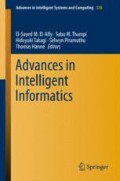Abstract
Word Sense Disambiguation (WSD) is a concept for disambiguating the text so that computer would be able to interpret appropriate sense which is not difficult for a human to disambiguate. It is motivated by its use in many crucial applications such as information retrieval, information extraction, machine translation etc. WSD uses the punjabi WordNet which helps this approach to search the appropriate sense by providing information like synonyms, examples, concepts, semantic relation etc related to an ambiguous word. India is a multilingual country where people speak many different languages, which results in communication barrier. This acted as a motivation behind the building of IndoWordNet which has wordnets of major Indian languages. The expansion approach is used by many indian languages to develop their wordnets from the hindi wordnet. Millions of people know punjabi language in india but little computerized work has been done in the field for this language. It is therefore worthy to build up a punjabi lexical resource (WordNet) that can discover the richness of punjabi language. Word sense disambiguation uses lesk’s algorithm in which context of ambiguous word is compared with the information concluded from WordNet and chooses the winner. The output will be the particular sense number designating the appropriate sense of ambiguous word. The evaluation has been done on the punjabi corpora and the results are encouraging.
Access this chapter
Tax calculation will be finalised at checkout
Purchases are for personal use only
Preview
Unable to display preview. Download preview PDF.
References
Brent, M.R.: From grammar to lexicon: Unsupervised learning of lexical Syntax. J. Computational Linguistics 19(2), 1–20 (1993)
Banerjee, S., Pedersen, T.: An Adapted Lesk Algorithm for Word Sense Disambiguation Using WordNet. In: Proceedings of Third International Conference on Intelligent Text Processing and Computational Linguistics, Mexico City, pp. 1–10 (2002)
Sinha, M., Kumar, M., Pande, P., Kashyap, L., Bhattacharyya, P.: Hindi Word Sense Disambiguation, pp. 1–7. Department of Computer Science and Engineering Indian Institute of Technology, Bombay (2004)
Sharma, R., Kumar, P., Sharma, R.K.: Word Sense Disambiguation (WSD). Master’s thesis. Computer Science and Engineering Department, Thapar University, Patiala (2008)
Narang, A., Kumar, P., Mohapatra, S.K.: Punjabi WordNet, Master’s thesis. Computer Science and Engineering Department, Thapar University, Patiala (2012)
Singh, V., Kumar, P.: Word Sense Disambiguation for Punjabi Language. PhD thesis. Computer Science and Engineering Department, Thapar University, Patiala (2013)
Author information
Authors and Affiliations
Corresponding author
Editor information
Editors and Affiliations
Rights and permissions
Copyright information
© 2015 Springer International Publishing Switzerland
About this paper
Cite this paper
Rana, P., Kumar, P. (2015). Word Sense Disambiguation for Punjabi Language Using Overlap Based Approach. In: El-Alfy, ES., Thampi, S., Takagi, H., Piramuthu, S., Hanne, T. (eds) Advances in Intelligent Informatics. Advances in Intelligent Systems and Computing, vol 320. Springer, Cham. https://doi.org/10.1007/978-3-319-11218-3_54
Download citation
DOI: https://doi.org/10.1007/978-3-319-11218-3_54
Publisher Name: Springer, Cham
Print ISBN: 978-3-319-11217-6
Online ISBN: 978-3-319-11218-3
eBook Packages: EngineeringEngineering (R0)

